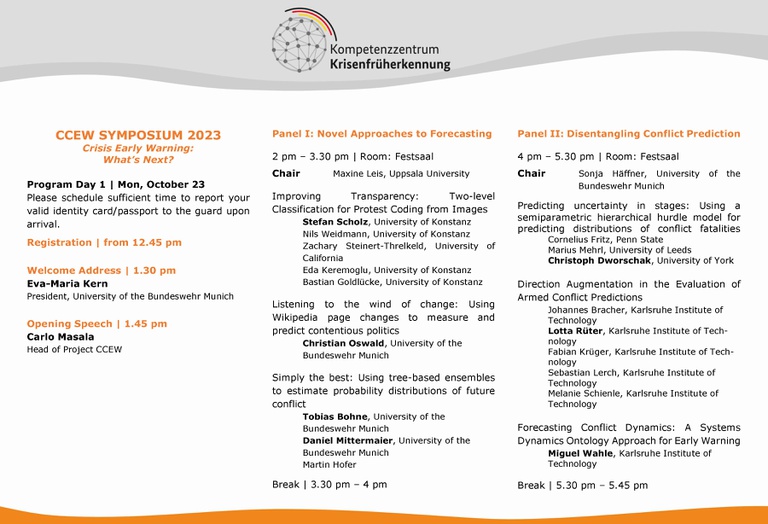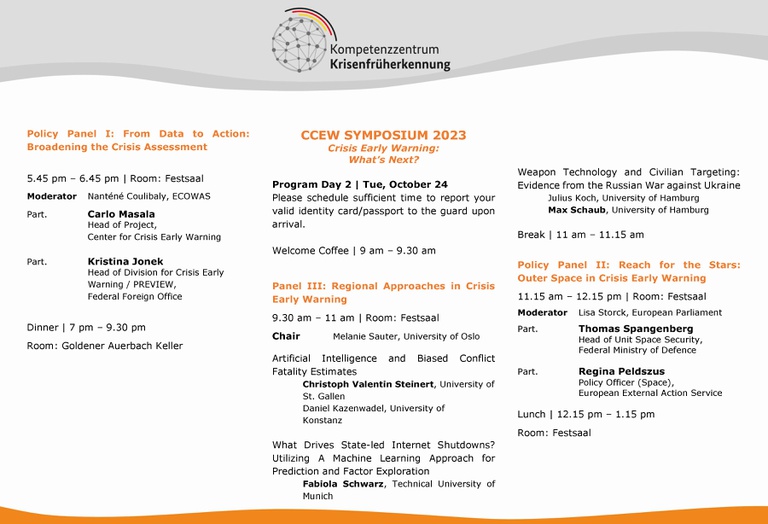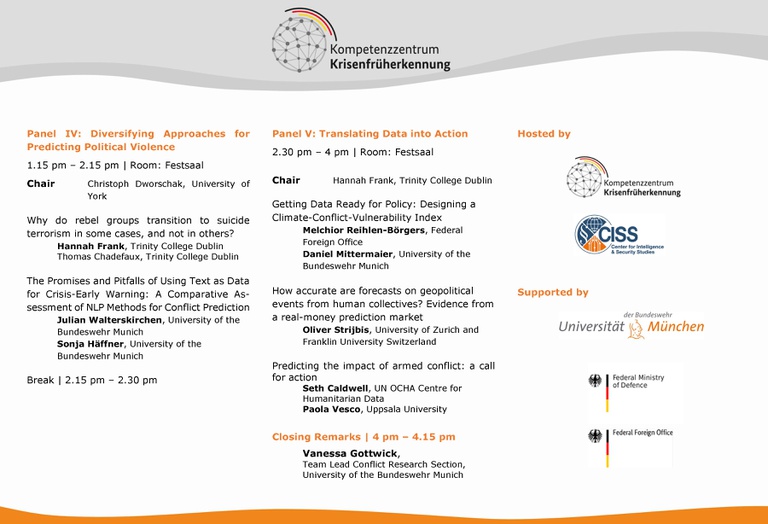The team of the Center for Crisis Early Warning would like to thank all participants of the CCEW Symposium 2023 for their attendance.
information and impressions
Information to the CCEW Symposium 2023
Date: October 23 to 24, 2023
Topic: Crisis Early Warning: What’s Next?
Opening Speech: Prof. Dr. Carlo Masala (Professor of International Politics & Head of Project CCEW)
Organiser: Center for Crisis Early Warning (CCEW) at the University of the Bundeswehr Munich
Location: UniCasino at the University of the Bundeswehr Munich
The CCEW Symposium 2023 Program: Detailed Description of the Panel Topics
Panel I: Novel Approaches to Forecasting Protest
Chair: Maxine Leis, Uppsala University
Recent years have seen a substantial increase in academic research on forecasting events besides armed conflict. This panel presents and discusses novel approaches to predicting protest movements. In terms of methodology, the panel investigates ways of improving transparency in detecting protest from images and methodological innovations in understanding how deaths caused by state repression affect protest cycles. Furthermore, the panel discusses the proposal of a new data source to measure levels of contention.
Panel II: Disentangling Conflict Prediction
Chair: Sonja Häffner, University of the Bundeswehr Munich
The introduction of new datasets and recent advancements in computing power, accompanied by methodological innovations, has improved our ability to forecast conflict. Nevertheless, reliably predicting conflicts remains a persistent challenge. We will unravel some of the numerous complexities in this session by exploring alternative approaches. On the one hand, we will investigate the potential of prediction markets and an ontology derived from systems theory to improve conflict prediction. On the other hand, the properties of the evaluation metric, TADDA score, will be assessed.
Panel III: Anticipating the Behaviour of Non-State-Actors
Chair: Christoph Dworschak, University of York
Civil conflicts are multi-layered and complex environments. Various non-state actors compete with each other and the government for power and territorial control. Interactions between violent and non-violent actors further complicate these dynamics. In this panel, we discuss actor-centric approaches to predict the severity of conflict. In addition, we engage in a debate on how to detect and prevent actor-specific behaviour such as illicit commodity trafficking.
Panel IV: Regional Approaches in Crisis Early Warning
Chair: Melanie Sauter, University of Oslo
Regional approaches to crisis early warning have become an increasingly important trend in recent years. This approach recognizes that many crises often occur within specific geographic contexts. This panel discusses regional approaches to predict distinct phenomenas including internet shutdowns in Africa, targeting of civilians in the Russian war against Ukraine, and the testing of hypotheses on Biased Conflict Fatality Estimates in different regional conflicts.
Panel V: Translating Data into Action
Chair: Hannah Frank, Trinity College Dublin
Despite significant advances in conflict prediction and crisis early warning, anticipatory and pre-emptive action on behalf of practitioners and policymakers are hindered by organizational and practical constraints. This panel aims to reflect on ways to translate crisis early warning data into action that may prevent conflict escalation and help minimize impacts, both through the lenses of academics and practitioners. On the one hand, this panel investigates features of an ideal Early Warning System. On the other hand, it discsusses ways to improve the conveying and receiving of politically or organisationally inconvenient warnings within intra- and supranational organizations.
Policy Panel I: From Data to Action: Broadening the Crisis Assessment
Moderator: Nanténé Coulibaly, Senior Early Warning Analyst, ECOWAS
The international community finds itself confronted by multiple, complex, and often interconnected crises. They range from ongoing conflicts in Ukraine, Somalia, or Yemen to dealing with far-reaching repercussions of climate change, economic downturns, and public health emergencies. In the face of multifaceted crises, risk assessment is crucial to every decision-making and planning process. The inherent goal is quantifying risks, dealing with uncertainties, and acting preventively. Data-driven forecasts play an essential role in dealing with such challenges. Especially AI-supported early crisis detection has made considerable advances in recent years. This panel will discuss the advantages and challenges of early warning tools.
Policy Panel II: Reach for the Stars: Outer Space in Crisis Early Warning
Moderator: Lisa Storck, European Parliament
The unrestricted use and independent access to space are essential to a state’s functioning in the civil and military spheres. However, outer space is an increasingly contested domain, playing a significant role in armed conflict and as a source of major power rivalries. Adversary actors are increasing their counter-space capabilities, while the number of non-state actors in outer space is growing exponentially. At the same time, space technology can also improve the anticipation and early detection of crises. How can Germany and Europe effectively protect themselves against threats such as the spread of space debris, the deliberate manipulation and destruction of satellites, and the vulnerability of space systems to cyber-attacks? What measures, possibly systemic changes, are necessary? How can space technology be used in crisis early warning? Which capabilities are already available today? Which will be needed in the future? Which measures and instruments are necessary to effectively integrate space aspects into the national crisis early warning process? Which role can civilian and commercial actors play in space-based crisis early warning? This panel aims to reflect on these questions from different disciplinary angles critically.
Impressions 2023
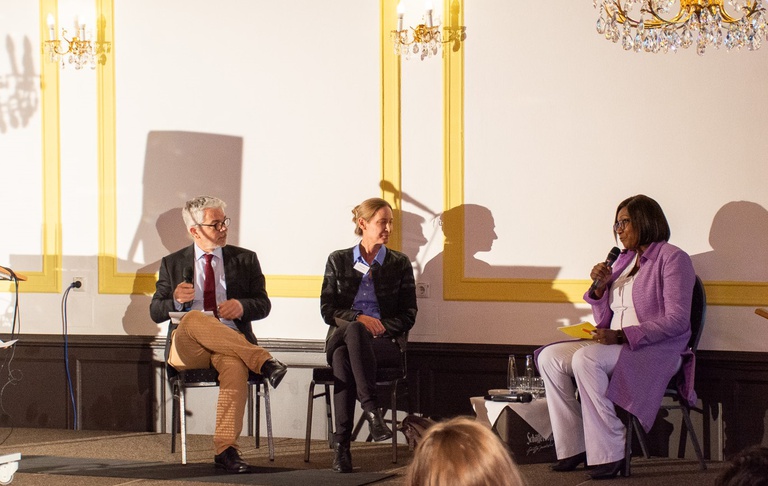
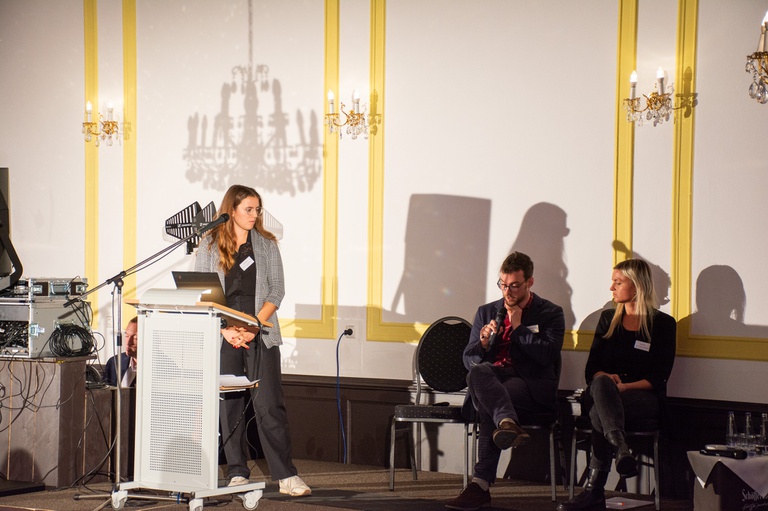


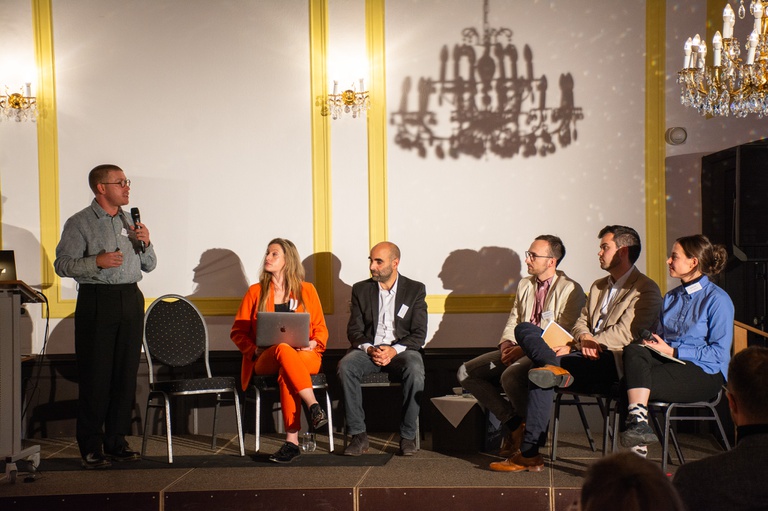
Picture: Nils Lange / CCEW
Chatham House Rule
We are pleased to welcome you to our upcoming event. As part of the event, we would like to draw your attention to the application of the Chatham House Rule, which is mandatory for all participants.
The Chatham House Rule aims to promote an open dialogue among participants while maintaining confidentiality. The rule states that participants are free to discuss the contents of the event, but must not disclose the identity or affiliation of the speakers or participants. This allows participants to share their views and experiences honestly and openly, without fear of being traced or published.
As organizers, we want to ensure that all participants have the freedom to express their opinions and views without any consequences. We therefore ask all participants to adhere to the Chatham House Rule and treat their discussions confidentially.
We are confident that the application of the Chatham House Rule will help facilitate an open and productive discussion that will be of great benefit to all participants.
We thank you in advance for your cooperation and look forward to your participation at the CCEW Symposium 2023.
Terms and conditions
The following terms and conditions set out the legal rules applicable to the CCEW Symposium 2023. Participants shall be bound by these terms and conditions upon registering for the Conference and are advised to read and understand these terms carefully before registering. The Organiser will not accept any conditions contradictory to or deviant from these general terms and conditions.
Organiser
Responsible for the organisation of the Conference is the University of the Bundeswehr Munich, Center for Crisis Early Warning, Building 33, on behalf of ITIS e.V. Werner-Heisenberg-Weg 39, 85577 Neubiberg, Germany.
Registration
Registration to the Conference must be done through the online registration system and is binding. The registration deadline is September 21, 2023. Participants will receive an automatic confirmation of the registration details. If you do not receive one, please send an email to kompzkfe@unibw.de to make sure that the organiser has received your registration. Registration will only be effective on receipt of the registration fee. Please notify any corrections to your registration immediately.
Fees and Payment Condition
The registration fee includes admission to the conference sessions, detailed program, morning and afternoon refreshment breaks, lunch and dinner (no drinks). Travel, accommodation and meal expenses are excluded from registration fees and result in additional expenses.
The participation fees are owed upon registration and are payable within 7 days following submission of the registration (but not later than 7 days before the starting day of the event). After your registration fee has arrived at our bank account you will receive an automatic e-mail message that the transaction was successful. All payments are made in Euro.
Participation is not guaranteed until full payment of the registration fee is received.
The conference program may be subject to changes.
Payments will be refunded if the conference will be canceled by the organizer. In that case, the organizer will have no further liability to the client. Registrations remain valid if the conference has to be postponed.
Liability
The organiser assumes no liability for the currency, accuracy, and completeness of the conference materials and content. The organiser also accepts no responsibility for any damages to persons or property that may occur during the conference.
Photographs and Videos
The Organiser may free of charge and without the further consent of the participants use and release pictures, shots and videos taken of the participants and/or their works (such as posters, excerpts of presentations or lectures) during the Conference for reports of the Conference and announcement of events in future.
Privacy Policy
All personal data provided to the organiser during registration will be treated confidentially. The data will be used and stored for further processing and documentation purposes. The information will not be reused for any incompatible purpose. Data will be shared with authorised service providers as necessary for the successful execution of the conference. The organiser will only disclose information to third parties if necessary for the fulfilment of the above-mentioned purposes.
Severability Clause
If any provision of these Terms and Conditions is found to be invalid, the invalidity of that provision will not affect the validity of the remaining provisions of these Terms and Conditions, which shall remain in full force and effect.
Disputes
All agreements between the Organiser and the Participant and all disputes which may arise between the Organiser and the Participants shall be exclusively subject to German law. Court of jurisdiction shall be Munich.
Bank information details
Account Holder: ITIS e.V. · Account No.: 27187376
Bank: Kreissparkasse München-Starnberg-Ebersberg · Bank Code: 70250150
SWIFT-BIC: BYLADEM1KMS · IBAN Code: DE50 7025 0150 0027 1873 76
